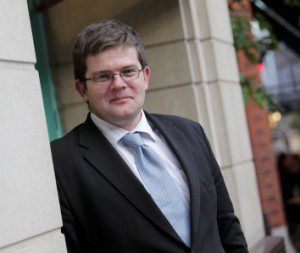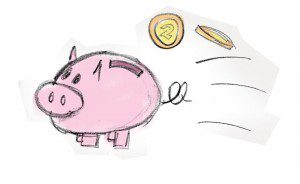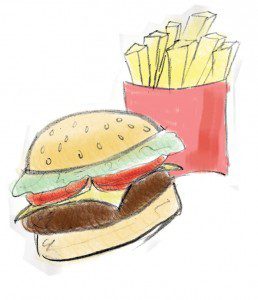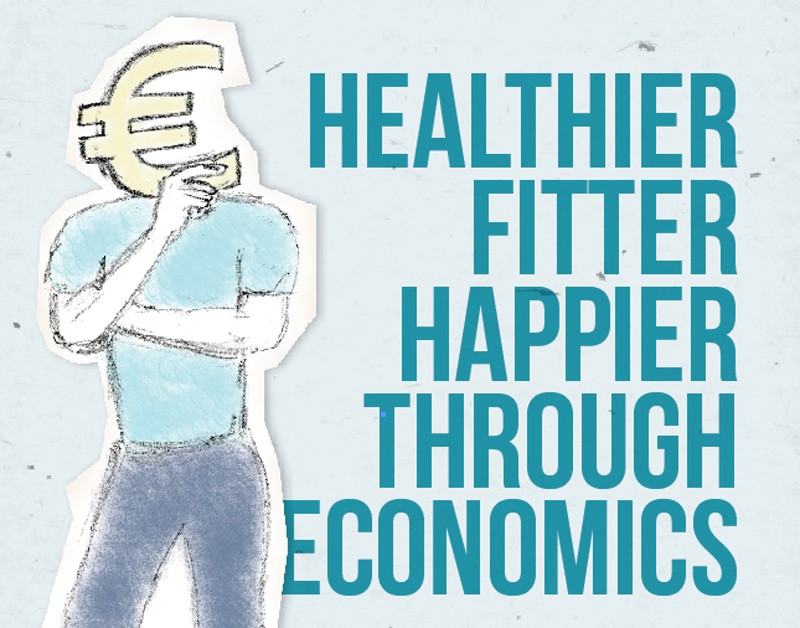People do not always act rationally. They overeat, overspend, and find it difficult to plan for the future. THINK met Prof. Liam Delaney to talk about how a new branch of economics might solve the pension crises, the obesity epidemic, the financial situation, help science, and make us feel better. Words by Edward Duca
In an alternate dimension, Homo economicus always make the best choices for themselves, are completely rational, and can all exercise absolute willpower. Back to today’s reality, Malta ranked 9th on a BBC global fat scale that I recently took, the world is still stumbling to its feet after the biggest recession in living memory, and every Saturday night in Paceville people regularly exhibit irrational behaviour.
The scenarios cusp the disconnect between traditional economic theory and how human beings behave. “I think the notion of individual rationality doesn’t even make sense anymore”, said behavioural economist Prof. Delaney (University of Stirling) when talking about how consumers make choices. Behavioural economics is a cross-disciplinary field that has made huge inroads into bridging the above gap. It considers a number of fields including evolution and psychology. In 1979, the psychologists Daniel Kahneman and Amos Tversky published Prospect Theory that started to explain how people make choices, judge and value. These are all at the root of human decision-making.Evolution can really shape irrational choices. Even when considering something like paranoia, when humans roamed forests it made sense to be overly alert to the slightest movement — a tiger could be waiting to pounce on you. But in today’s world, it has become a potentially serious and debilitating condition — most worries are in your head (step in psychology). This comes out in economics. “If you’re too distrusting then you can lose a lot of trade. In economics this is called betrayal aversion, it says that people often pass up opportunities because of the fear of betrayal. For example, losing €100 from your wallet feels bad, but losing €100 because of your friends feels a lot worse”, explained Prof. Delaney.
“People prefer situations where they can simply say: I’m leaving for the weekend can you keep an eye on the house”
Loss aversion means that financial institutions cannot be run on incentives alone but need trust. “Where trust is higher, financial institutions do better. It is mutually reinforcing.” Psychology has had a huge influence on economics. Kahneman won the Nobel prize in Economics in 2002. Take trust as an example, lack of trust has a cost and is related to social capital. Societies that lack social capital will under perform, since they “have to spend big percentages of their GDP on security and legal contracts against each other”, continued Prof. Delaney. There is an economic benefit when groups cooperate. It also promotes wellbeing.
The economics of happiness

An unfashionable topic years ago, but now there is a huge body of literature exploring happiness and economics. Prof. Delaney thinks “we should be designing institutions that make us happier”. The field has also been described as the “economics of walking around and asking people what they think and taking it seriously. […] In general, people do tell you and know if they are unhappy about a situation. There was a big connection between behavioural economics and well being”. Prof. Delaney thinks that countries underinvest in pain-reduction and early childhood intervention. Both would improve people’s lives tremendously.
Social capital promotes wellbeing. “People prefer situations where they can simply say: ‘I’m leaving for the weekend. Can you keep an eye on the house?’ rather than ringing somebody and paying them to come over with a security van. Even if it’s the same service there is evidence that suggests people prefer asking your neighbour — people feel happier”, continued Prof Delaney. This reasoning is not how people might normally view economists.
“The issue is to stop thinking about it as economic incentives being made by disembodied individuals and start thinking about how people interpret who is doing it and why they are doing it”, said Prof. Delaney when we were talking about policies to change behaviour. By talking to its citizens, policy makers need to start analysing why some policies fail and others succeed. “This is something that comes out in Marie’s research, [Marie Briguglio lectures at the University of Malta and conducts research on behavioural economics]. Changing default options can be particularly effective. [Governments need to] change incentives and label them very clearly. People got a plastic bag tax very quickly”, remarked Prof. Delaney. This worked in Ireland, not so well in Malta; in Greece it increased plastic bag use. Policy makers need to look at traditional instruments (like local culture) and make them fit better to how people make decisions.
Economics helping science
“Science communicators are incredibly important; designers are incredibly important”
The next EU funding round called Horizon 2020 will see science adsorbing tens of billions of euros. “Enormous amounts of money are rightly going into science and the public is feeling that this is not in their interest”, stated Prof. Delaney. The importance of science and public opinion seem disconnected. “We need to stop the scenario where all this money is going into developing technologies with pretty much no resources going into finding out what the public finds acceptable. How can you make these technologies acceptable and align them into how the public behaves?” This means investing in public consultations and people who can engage the public with science creatively. “Science communicators are incredibly important; designers are incredibly important”, emphasised off Prof. Delaney.
Behavioural economics for government
“David Cameron has just set up a behavioural insights team in the Cabinet — this is a group of physiologists, social marketers and economists […] it’s a very innovative thing”, said Prof. Delaney. But why should a Conservative government introduce more regulations? “Since budgets are limited, some countries are [accepting] that we have to come up with better ways of spending it, which could be very good.” In the UK, this team has already helped reframe how energy bills should be provided to people. There are currently tens of thousands of tariffs, now they are being regulated to provide people with the cheapest tariff.
If the UK has adopted this approach, should Malta? An open question. This new approach tip toes between mandatory and non-mandatory. It could just make the market work better, damping future financial crises. “It makes people feel more secure”, stated Prof. Delaney.
A good frame of mind
“It’s not that people are irrational in terms of being stupid, just that it’s not the way that people make decisions”, stated Prof. Delaney. Decision makers need to consider how options are framed to consumers.  Nowadays everything is framed for us, online shopping is rife with recommended listings, mobile tariffs, pension schemes, loans, absolutely everything has options, upgrades, and other categories are all seeking our attention. The consumer has little hope of rational choice.
Nowadays everything is framed for us, online shopping is rife with recommended listings, mobile tariffs, pension schemes, loans, absolutely everything has options, upgrades, and other categories are all seeking our attention. The consumer has little hope of rational choice.
So, what can be done to help consumers make better choices? The first option has already been mentioned: “actively shape consumer choices and make the default options better”, stated Prof. Delaney. In pensions, some economists are suggesting “opt out instead of opt in”, while “fast food outlets shouldn’t be asking you whether you want to upsize but framing [it] so that you take the lighter option”. This technique is called behavioural intervention and can help shape consumer choice.Prof. Delaney suggested another two options: educating people to make the better choice and forcing mandatory changes. Simply put, do not allow people to buy products that are bad for them or the world around them. Prof. Delaney suggested that regulation might be the best approach for the very big issues (obesity, pensions, the environment, financial crisis and so on).
The devil is in the details
Companies already give consumers all the information they need. The problem is that most people cannot, or do not have the time, to understand hundreds of options. According to Prof. Delaney, “they should be explained to you in a way as if you’re explaining it to a 12-year old”. He is not being derogatory, he is emphasising communication. It is key, not only in marketing and advertising, but for people to make the right health and financial choices.
Prof. Delaney thinks that apps will be one key part of this change in consumer-to-buisness relationship. He continued describing how apps could be developed to recommend certain foods, or which shop on your street sells the cheapest towels. “The app would give the customer the bigger deal.” It would need to be automatic using efficient sensor technology to suggest the best outcome for the consumer. “In the short term this might lower profits, but if customers start to trust companies more, this could help increase the market size and have a more innovative market.”
Why should behavioural economics butt in?
Obesity is a huge problem. In the U.S., in 2011 it cost individuals $6,518–$8,365 more per year for obesity-related expenses. For the U.K., obesity’s impact on the economy could reach £27 billion by 2015 according to a Foresight report. “Both Malta or Ireland have public health systems, so if someone is getting more obese, more heart disease and diabetes, that affects everyone. So, it’s not a matter of personal choice”, said Prof. Delaney. Personal choice clearly isn’t working. As I stated above, Malta ranked number nine on a global fat scale. Though these rankings change, Eurostat revealed in 2011 that Maltese women are the second most obese and men top the EU rankings. The Maltese are making some very irrational food choices.
Even Harvard is recommending prevention to stop excessive economic strain on countries. “The food industry is starting to realise that this is something that could rebound on them if the public and politicians start to think that it is popular for the food industry to be seen as the bad guys.” In the long run, companies could suffer excessive regulation. Most people already know what they should do: cut down on the pastizzi, fast food and meat, eat more vegetables and fruit, and exercise and so on, but less are doing it.
“The problem with obesity is evolution”
We’re designed to love high-calorie, sweet, savoury, fatty food to beef when times are good and burn it off when crops fail. We have a lot of baggage from our evolutionary history. Fast food chains, have only been around for the last few decades and it’s harder to make healthy food as good to eat. Against millions of years of evolution, what hope do consumers have?
“This is where behavioural economics fits in, which traditionally has not been on that side. It’s traditionally been thought, that people in public health should think about these problems not economists. If you think about it, it’s resource allocation and organisation of public spending. These are fundamental questions of economics”, explained Liam. 
Governments and companies need behavioural economics because it will help shape the most effective regulations for all, and the stakes are very high. “It’s not the apples and oranges tradeoffs we teach students, but [decisions that] will shape the pattern of society in the next 10–20 years.”
Essentially behavioural economics argues for pilot studies. When introducing policies or regulations, governments (or other bodies) should be running small level trials, analysing the results and building on them. Prof. Delaney explained, “there isn’t a perfect equation and still a lot of experimentation, some things work well and some things don’t work. […] We need to redesign our institutions to work towards the future. […] We just need to find political leaders who can look beyond a five-year cycle. I don’t think it’s that utopian a vision, but common sense”.






Comments are closed for this article!